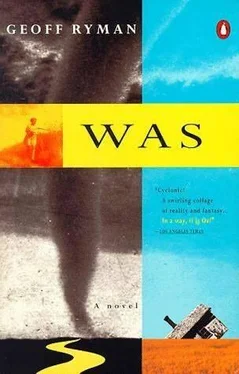"Yes, Aunty," said Dorothy. The rule was: When you don't understand, agree.
Aunty Em pursed her lips and narrowed her eyes into an expression of cramped sweetness. She stroked Dorothy's face. "You are my own sweet sister's child," she said, with misgiving.
"Yes, Aunty." Dorothy's toes and fingers ached with the cold and she wanted to get inside.
Aunty Em was still scanning her face for imperfections. "Can't see a shadow of that man at all," she said. That man meant Dorothy's father.
"Yes, Aunty," said Dorothy.
The funeral was being held in the schoolhouse. Zeandale had gone to the effort of building a church, but the roof had blown off in a cyclone almost as soon as it was finished. Aunty Em kept an eye on the front door. When the Jewells finished maneuvering themselves through it, she stood up, and finally, finally, she and Dorothy could go inside. They walked together hand in hand; Uncle Henry followed with the framed hair flower. The Kansas earth underfoot was frozen as hard as rock. Dorothy tripped and stumbled; Aunty Em hauled her up by the hand. No one was to fall.
Dorothy knew that there had been some kind of trouble. There was a graveyard in the hills outside of the town. Some people had not wanted Wilbur buried there because he had killed himself. Dorothy wondered if they had done something to the ground to close it against him. Would God freeze the ground to stop someone from being buried?
They went into the schoolhouse, and it was colder inside than outside. The little stove had been stoked that morning, but all the heat rose up into the ceiling. As thick as a muddy river, currents of cold air flowed about their feet. The walls were white; the windows were white. The mourners had to sit on school benches. The place was full of adults all in black like some giant species of insect. There were children, too, some of them from Sunflower School, where Wilbur had gone. They were all real quiet and hung their heads and scowled. Dorothy knew that scowl. It was the Indian scowl. You made it when something didn't make sense.
There was a wall of memorials. In midwinter, there were no flowers. There were woven pine branches and pillows stuffed with potpourri and scrolls with writing on them. Aunty and Uncle filed past them. They looked a long time at each one. Dorothy wondered why. Uncle Henry pushed the frame at her.
"Put yours here, Dorothy," whispered Aunty Em. Dorothy leaned it against the wall without ceremony. She was glad to be rid of it. Aunty Em pushed her shoulders. Down. Like at prayers, Dorothy had to kneel. So she did. Then Aunty Em tapped her on the shoulders and she stood up. You just did what you were told. Then they went and sat on the cold, cold bench, next to people they didn't know, and Dorothy knew she would hate it. It would be long and full of words and nobody would be allowed to move. Dorothy started to rock. Aunty Em stopped her. The Jewells went to the front bench and sat down together.
Dorothy watched Mrs. Jewell. She rocked too. She rocked from side to side, and she was shaking, like some old cart on a bumpy road.
"Is she rocking 'cause of the cold?" Dorothy asked.
"Sssh," said Aunty Em. Of course you weren't supposed to talk, but Dorothy had thought one question would be allowed, about a nice woman who was cold.
The Preacher came in. He was a young man, slightly plump. He had come in from Deep Creek to preach. People coughed. He looked up at them.
"Thank you all for coming in this terrible weather. I think it is a measure of Kansas sympathy that everyone here managed to show."
They were told to sing. Dorothy tried to look behind her at the people singing and was turned around. Then they said a prayer. Dorothy had to make sure that Aunty Em heard her say the words. It was one of the worst things Aunty Em had found out when she came, that Dorothy did not know her prayers.
The power and the glory
Forever an never
Hay men.
Dorothy didn't know what they meant.
Then the Preacher spoke.
"This is the saddest of occasions," he said. "The death of a young man in a way that in a less generous community would have precluded Christian interment. It is something that is hard for all of us to face, most especially his parents, who must be wondering how and why they failed him. All of us share that sense of having failed. I knew Wilbur Frederick Jewell as a boy and as a young fellow approaching manhood and knew him to be a well-mannered youth, who gave no outward sign of the worm within. We must all of us, in the privacy of our thoughts, come to our own conclusions about Wilbur. But in this memorial service, we must remember his virtues and pray that they weigh heaviest in the scales of justice when his soul is judged in Heaven. Perhaps the prayers of those who love him and the true love of the Lord Jesus can atone and win forgiveness."
It went on like that. Mrs. Jewell shook so much the pew rattled. Aunty Em clicked with her tongue. Dorothy could feel her aunt go harder and fiercer. There were more songs and another prayer. They all bowed their heads and prayed for the young man's soul. Dorothy didn't know that one, so mumbled, looking sideways to see if Aunty Em was angry. She looked angry, but Dorothy thought perhaps not at her.
Finally it was over. Why did everything have to last so long? Mrs. Jewell was making her way toward the church door, with the speed of clouds on a rainy day. They all had to sit for her. Dorothy's legs wanted to move, and started to twitch, and once again, of course, Aunty Em stilled her.
They waited while other people went out one by one. People shook hands with the Preacher and then spoke to the Jewells, offering a few words as if from a high platform looking down. Or they looked embarrassed, nodding, shaking hands, and then left, ducking for some reason, though the doorway was not low.
Dorothy felt her own secret gift, folded and crisp, inside her mitten.
Aunty Em patted her and then pushed her: now it was time to move. Dorothy swung her legs around and jumped down to the floor. The school students were ahead of them. They were the very last. Dorothy couldn't wait to be gone. The students had little to say. They ducked the most and gathered outside. From somewhere far enough away came the sound of laughter. The Preacher stood next to Bob Jewell, hands clasped.
"A cold day, young man," said Aunty Em to the Preacher. "And an even colder sermon. Perhaps when you are a bit older, you will also learn to be wiser."
The Preacher was not used to being criticized. He looked dumbfounded.
"I simply mean," said Aunty Em, "that it is not your job to increase the grief of the bereaved."
"I'm sorry if I left that impression," he said.
"It is not to me, but to the young man's mother that you should perhaps address a few more kindly words," said Aunty Em. "I may say that it would not have happened in our congregation or with another preacher."
The Preacher chuckled. It was a very nasty chuckle. Dorothy thought: Why is he laughing? He chuckled and shrugged.
Aunty Em took Mary Jewell's hand. She took it and then suddenly seized it hard, a different gesture altogether. Then she moved on.
It was Dorothy's turn. "I've got a present for you, Mrs. Jewell," said Dorothy.
Aunty Em turned. What present?
Mrs. Jewell leaned over, with her great breathy wrinkled weight. Dorothy unfolded the piece of paper from inside her mitten. The present was a drawing. Dorothy passed it up to Mrs. Jewell.
"Thank you, Dorothy," said Mrs. Jewell. "What is it?"
"It's an Indian," said Dorothy. "I only had a pencil so it had to be a Kansas Indian. That's gray. A real Indian would be red."
"That's very nice, Dorothy, now come along," said Aunty Em, advancing.
"That's why he hanged himself," said Dorothy. "He wanted to be an Indian, a real Indian. But he wasn't brave enough."
Читать дальше












